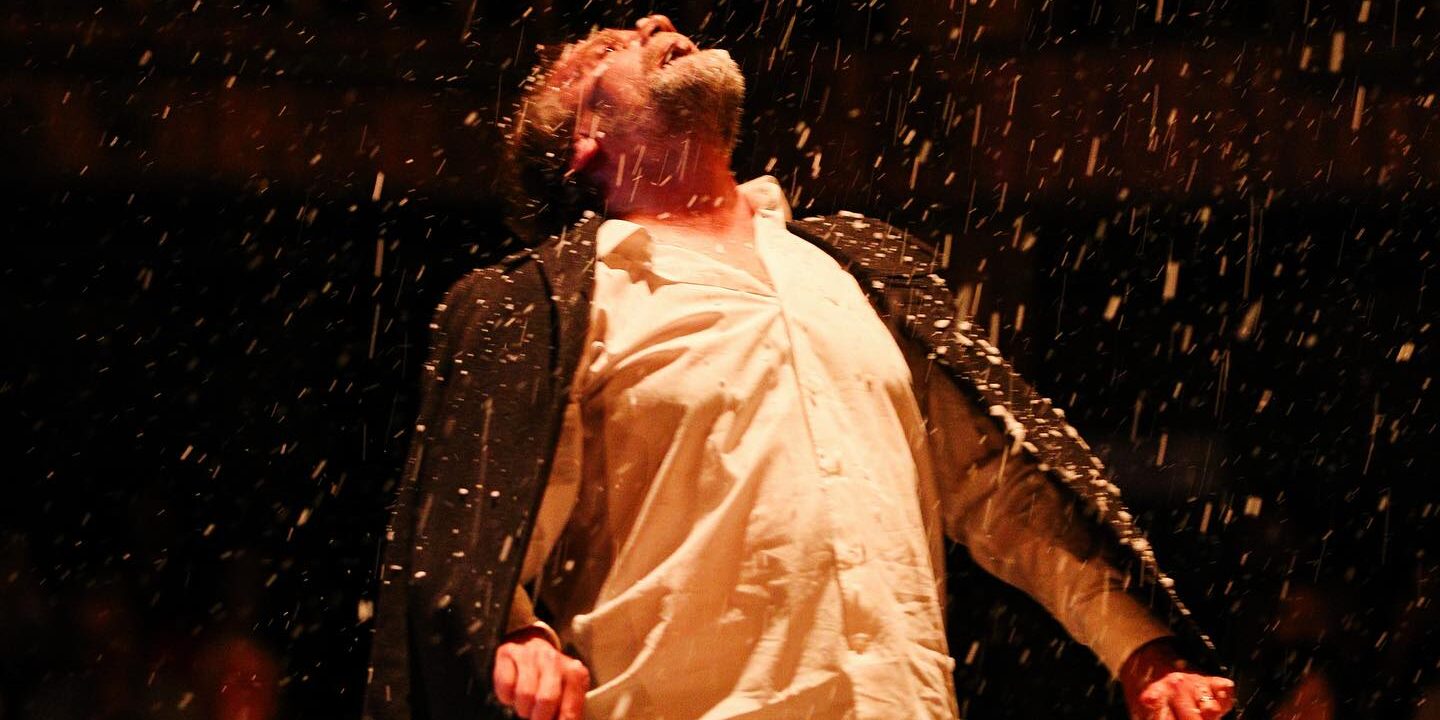Teatri Metropol, Tirana, premiere April 2024
It’s fine line that separates a symbiotic familial relationship from a parasitic one. In Before Sunset, which is based on the 1930s play by the Nobel prize-winning dramatist Gerhart Hauptmann, the various members of the Clausen family walk this line in respect to their relationship with their father Mathias.
Played by Alfred Trebicka, Mathias Clausen is a 70-year-old widower whose wife passed away three years ago. He is the head of a large company, his health is failing and his family have hopes of a sizeable inheritance when he dies, however Mathias has fallen in love with the beautiful, much younger Inken Peters (played by Ilirda Bejleri). The entire Clausen family is against this relationship, with some hiding behind the memory of their deceased mother, while some suspicious that Inken is set to be the beneficiary of wealth and others, led by son-in-law Erich Klamroth, trying to manipulate the situation for their own benefit.
The play explores the full range of complicated responses the family feels about the relationship between Mathias and Inken. The directors, Andia Xhunga and Indrit Çobani, embrace the duality that is present in the text and the ambiguous spirit in which the characters are written.
The role of Mathias Clausen is a challenging one. He goes through a series of mental and emotional crises throughout the play and, eventually, a complete transformation. Trebicka brilliantly manages to get under the skin of this complex character, capturing his rage against the world as well as the disappointment he inflicts on his family. He is electric in his monologues, fully conveying Mathias’ increasingly unstable mental state. As Inken, Ilirda Bejleri also impresses with her performance, bringing a different perspective to the show, although if the role had been more dualist (as is the nature of the work), it would have made the show stronger. As brother-in -law Erich, Alert Çeloaliaj also has a challenging role to play – as his character has to convince as a legitimate opponent of Mathias while at the same time maintaining his status in the family, as son-in-law – but Çeloaliaj manages this well.

Before Sundown, Metropol Theatre
We open on the day of Mathias’ birthday party. Everyone has gathered to celebrate, to feast and rejoice, but among the glances and jokes you can read a darkness in each character. After the festivities, the actresses smile and interact with the audience, trying to present the image of a happy family in the eyes of others. However, in the very next scene we witness a sexual act between Erich and Mathias’ daughter-in law Paula (Luli Bitri), which makes plain the dishonour and decadence of this aristocratic family. Directors Xhunga and Çobani wonderfully place these two realities alongside one another other, in a warning for what comes next.
The set design (by Genc Shkodrani), costume design (by Edlira Qyshka) and music (composed by Endri Sina) are in complete harmony. The slightly raised podium, on which all the events take place, is illuminated by many small lights; on this imaginary dance floor, the characters dance, fall in love, fight and die. However, sometimes lighting and music are used to turn this podium into a more intimate and magical place. While the costumes exude luxury, Inken’s costumes could have been better suited to her character. Her clothing seems to be chosen to make her look even younger than she is, however Inken, in her discussions with her mother Mrs. Peter (Yllka Mujo), is constantly reminding her that she is not a child anymore and you suspect this would be reflected in the way she dresses and how she presents herself.
Hauptmann was one of the founders of German naturalism, and while Xhunga and Çobani have preserved the basic elements of naturalism in their production, they have also dared to go beyond it. They have added some very interesting elements, including the use of an opera choir, a piano and a soprano to add textural richness to the show.
In one of the most emotional moments, Mathias, in front of his family, rips the portrait of his dead wife with a knife, making a solemn call to be free from his past, from his children – and from himself. Trebicka brings the same energy to the moment of suicide, placing the man in his true frame, powerless to stop the process of aging and undervalued by others as a result. In these moments, the show transcends its aesthetics.
The play depicts one man’s aggressive attempt to take control over his life, while emphasizing that death is also a form of freedom, one we can chose without surrendering – a choice that takes courage – a description of the relationship between life and death that is yet another example of the duality that permeates the production.
Credits:
Directors: Andia Xhunga and Indrit Çobani//Scenography: Genc Shkodrani//Costume design: Edlira Qyshka//Music composed by Endri Sina








